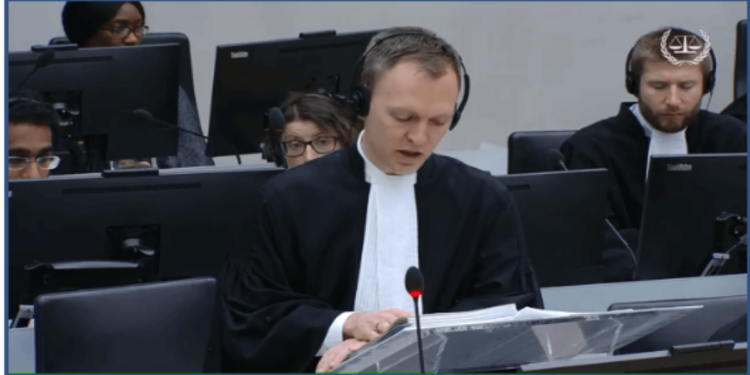By: Tom Maliti, IJ Monitor
The chamber adjudicating the trial of Dominic Ongwen ordered he be removed from court after he disrupted proceedings on Monday, March 19. His trial was just resuming after a break of almost three weeks.
The disruption happened during the afternoon session as Gillian Clare Mezey gave her opinion of Ongwen’s mental state based on extracts of testimony previous prosecution witnesses had given about their interaction with Ongwen when he was a commander of the Lord’s Resistance Army (LRA).
Mezey had given her views on seven pages of extracts of witness testimony in open court when, as she began to comment on the next extract, Thomas Obhof, one of Ongwen’s lawyers, asked that her comments be in private session because the extract was taken from a court transcript that was confidential. It was some time after that that Ongwen disrupted the hearing while it was closed to the public.
The hearing was opened to the public about 40 minutes later. When the hearing resumed, Presiding Judge Bertram Schmitt asked the defense to say something because what had happened was “severe and serious.”
Charles Taku, another of Ongwen’s lawyers, began by commenting on the extracts that Mezey was giving her views on and Judge Schmitt cut him short, saying the chamber was not entertaining any litigation on any issue but wanted to hear from the defense.
Taku then said the issue of Ongwen’s mental state was something the court “has been fully aware of.” He referred to a time when there was a combative witness in court, P-003, and Ongwen’s statement to court then.
“We need to critically think how we will handle this matter for the future of the proceedings,” said Taku.
Obhof asked that a psychologist or psychiatrist see Ongwen as soon as possible.
Judge Schmitt said the chamber would invoke Article 63(2) if Ongwen refused to attend court on Tuesday or if there was a slight disruption in the proceedings.
He said this would mean Ongwen “will have to follow the hearing via video link from the detention center.” Judge Schmitt said he hoped Ongwen would have calmed down by Tuesday.
“We would appreciate that the defense take part in such a calming down,” said Judge Schmitt.
He told Ongwen’s lawyers that the chamber would consider it “a sign of understanding by your client if he could give a statement.”
“The hearing will resume tomorrow [Tuesday] at 9:30, with or without the accused [Ongwen],” concluded Judge Schmitt before adjourning Monday’s hearing.
Ongwen has been charged with 70 counts of war crimes and crimes against humanity that allegedly took place between July 2002 and December 2005 in northern Uganda. During this period he was an LRA commander. Ongwen has pleaded not guilty to all counts.
His trial had been on a break since February 28. At the beginning of Monday’s hearing, Mezey told the court she had taken partial retirement from Britain’s National Health Service, but she is still a forensic psychiatry professor at St. George’s, University of London.
Prosecutor Colin Black then took Mezey through the steps required for her expert report to be admitted as evidence under Rule 68(3) of the ICC Rules of Evidence and Procedure. This follows a November 16, 2017 decision Judge Schmitt made to allow Mezey to testify and have her report admitted as evidence under Rule 68(3). In that decision, Mezey is not identified by name but by witness number P-446.
Once Black completed the Rule 68(3) procedure, he then asked Mezey a series of questions. These included asking her to explain some concepts of psychiatry and giving her views on extracts of transcripts of the testimony of previous prosecution witnesses.
The concepts Mezey explained in detail were post-traumatic stress disorder, depressive disorder, and dissociative identity disorder. Mezey also told the court that Ongwen declined to see her.
“How did that affect your ability [to evaluate Ongwen]?” asked Black.
“It would have been desirable to assess Mr. Ongwen because there are a number of matters that I would have wanted to put to him. I had an advantage of being provided an enormous bundle of documentation, which reflected on his mental state over a period of time,” replied Mezey.
“Including medical records. Including witness statements. I, therefore, felt this gave me an accurate picture, a very good picture of his mental state including the period [July 2002 to December 2005] that I was being asked to comment on,” continued Mezey.
When commenting on the extracts of the transcripts of witness testimony, Mezey made a general comment that they showed Ongwen as someone who had “agency.”
She said the extracts negate “any suggestion of duress that is an individual being coerced to commit acts for fear of violence or harm to themselves. There are a number of entries that indicates he has moral awareness, or awareness between right and wrong.”
“[Extract] number three seems to me that here he is describing a man, Mr. Ongwen, who rises up through the ranks because of his ability as a fighter, because he is respected by the men and who is, I suppose, regarded as being solid and reliable,” Mezey said.
“He’s described as tough, which is an interesting word and is one which would not be applied to an individual who is mentally unstable,” said Mezey.
Soon after these observations is when the hearing went into private session and the disruption ensued.
Mezey will continue testifying on Tuesday.
This article was first published on the International Justice Monitor.







